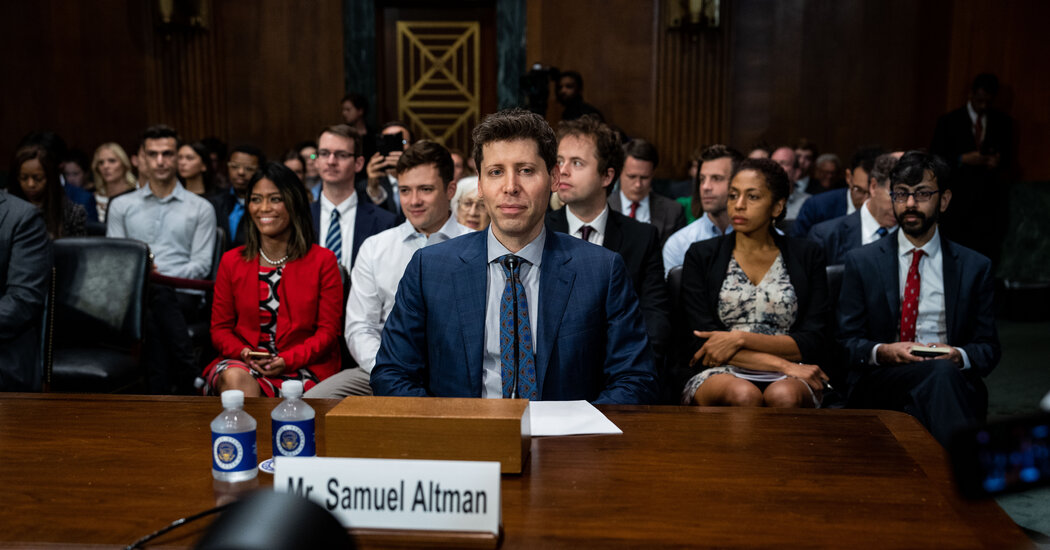The Federal Trade Commission has opened an investigation into OpenAI, the artificial intelligence start-up that creates ChatGPT, over whether the chatbot harmed consumers by collecting data and publishing false information about individuals.
In a 20-page letter sent to the San Francisco company this week, the agency said it was also investigating OpenAI’s security practices. The FTC asked OpenAI dozens of questions in its letter, including how the startup trains its AI models and handles personal data, and said the company should provide the agency with documents and details.
The FTC is investigating whether OpenAI “engaged in unfair or deceptive privacy or data security practices or engaged in unfair or deceptive practices related to risks of harm to consumers,” the letter said.
The investigation was previously reported by The Washington Post and confirmed by a person familiar with the investigation. OpenAI declined to comment.
The FTC investigation poses the first major U.S. regulatory threat to OpenAI, one of the world’s leading AI companies, and indicates the technology may come under increasing scrutiny as people, companies and governments more AI-powered products to use. Rapidly evolving technology has raised the alarm because chatbots, which can generate answers in response to prompts, have the potential to replace humans in their jobs and spread misinformation.
Sam Altman, who leads OpenAI, has said the burgeoning AI industry needs to be regulated. In May, he testified in Congress to call for AI legislation and has visited hundreds of lawmakers, aiming to create a policy agenda for the technology.
“I think if this technology goes wrong, it could go pretty wrong,” he said at the hearing in May. “We want to work with the government to prevent that.”
OpenAI has already come under regulatory pressure internationally. In March, Italy’s data protection authority banned ChatGPT, alleging OpenAI had unlawfully collected personal data from users and lacked an age verification system to prevent minors from being exposed to unauthorized material. OpenAI restored access to the system the following month, saying it had made the changes requested by the Italian authority.
The FTC is responding to AI with remarkable speed, opening an investigation less than a year after OpenAI introduced ChatGPT. Lina Khan, the FTC chair, has said technology companies should be regulated as technologies are emerging, rather than just as they mature.
In the past, the agency usually launched investigations after a major public misstep by a company, such as opening an investigation into Meta’s privacy practices following reports that it shared user data with a political consultancy, Cambridge Analytica, in 2018.
Ms Khan, who testified about the agency’s practices at a House committee hearing on Thursday, previously said the AI industry should be scrutinized.
“While these tools are new, they are not exempt from existing regulations, and the FTC will vigorously enforce the laws we need to enforce, even in this new market,” she wrote in an op-ed in The New York Times in May. “As technology evolves rapidly, we already see several risks.”
The research could force OpenAI to reveal its methods around building ChatGPT and what data sources it uses to build its AI systems. While OpenAI has long been fairly open about such information, more recently it has said little about where the data for its AI systems comes from and how much is used to build ChatGPT, likely because it is wary of competitors copying it and is concerned about lawsuits over the use of certain datasets.
Chatbots, also used by companies like Google and Microsoft, represent a major shift in the way computer software is built and used. They’re poised to reinvent Internet search engines like Google Search and Bing, talking digital assistants like Alexa and Siri, and email services like Gmail and Outlook.
When OpenAI released ChatGPT in November, it instantly captured the public’s imagination with its ability to answer questions, write poetry, and riff on almost any subject. But the technology can also mix fact with fiction and even fabricate information, a phenomenon scientists call “hallucination.”
ChatGPT is powered by what AI researchers call a neural network. This is the same technology that translates between French and English on services like Google Translate and identifies pedestrians as self-driving cars navigating city streets. A neural network learns skills by analyzing data. For example, by pointing out patterns in thousands of cat photos, it can learn to recognize a cat.
Researchers in labs like OpenAI have designed neural networks that analyze vast amounts of digital text, including Wikipedia articles, books, news stories, and online chat logs. These systems, known as large language models, have learned to generate text on their own, but can repeat erroneous information or combine facts in a way that produces inaccurate information.
In March, the Center for AI and Digital Policy, an advocacy group that pushes for ethical use of technology, asked the FTC to prevent OpenAI from releasing new commercial versions of ChatGPT, citing concerns about bias, disinformation and security.
The organization updated the complaint less than a week ago, detailing additional ways the chatbot could cause harm, which it also said OpenAI had pointed out.
“The company itself has acknowledged the risks associated with the release of the product and has self-cited regulation,” said Marc Rotenberg, the president and founder of the Center for AI and Digital Policy. “The Federal Trade Commission must act.”
OpenAI has been working to refine ChatGPT and reduce the frequency of biased, false, or otherwise harmful material. As employees and other testers use the system, the company asks them to rate the usefulness and veracity of the answers. Then, through a technique called Reinforcement Learning, it uses these assessments to more precisely define what the chatbot will and won’t do.
This is an evolving story. Check back later for updates.

